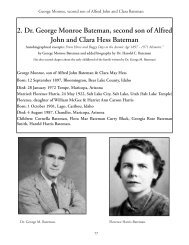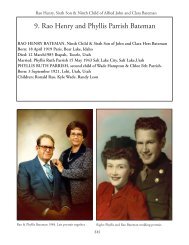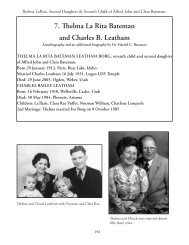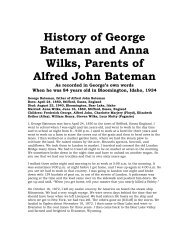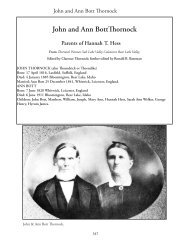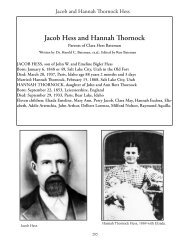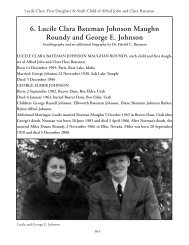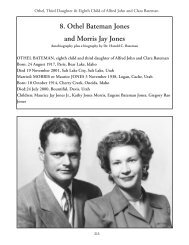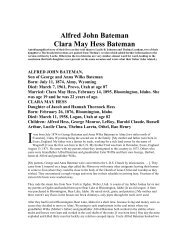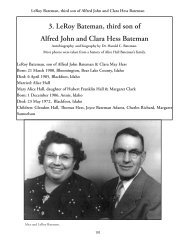John W. Hess and Emeline Bigler Grandparents of ... - Bateman Family
John W. Hess and Emeline Bigler Grandparents of ... - Bateman Family
John W. Hess and Emeline Bigler Grandparents of ... - Bateman Family
You also want an ePaper? Increase the reach of your titles
YUMPU automatically turns print PDFs into web optimized ePapers that Google loves.
Across Three Centuries Alfred <strong>John</strong> <strong>Bateman</strong> & Clara May <strong>Hess</strong> <strong>Family</strong>Franks yelled “HALT”. They ran all the faster <strong>and</strong> him after them. Heshot over their heads. They fainted <strong>and</strong> fell into the weeds. It wasn’t longuntil polygamy was abolished by the leaders <strong>of</strong> the church. So that putan end to the foulest persecution that was ever imposed on God fearing,honorable men, hundreds <strong>of</strong> them. Like my father, hunted <strong>and</strong> trackeddown like wild animals. Their heads shaved <strong>and</strong> put in the penitentiary.Someone, sometime will have something to answer for. I hope they willanyway.Now I am going to tell you how father <strong>and</strong> his wives lived polygamy,because it took both him <strong>and</strong> them to make a success <strong>of</strong> it. Father was avery good manager in every way. When my mother married my father,she was the last wife <strong>of</strong> seven. His first <strong>and</strong> second wives were dead,Aunt <strong>Emeline</strong> <strong>and</strong> Aunt Emily. That left five families. Aunt Julia livedabout two miles out <strong>of</strong> town. She was a Mormon convert from Norway.I have heard her tell when she was coming over on the boat, they wereeating sweet corn on the cob. When hers was finished she held it up <strong>and</strong>said, “Please put some more beans on my stick.”Aunt Caroline lived across the street. Then there was Aunt MaryAnn, Aunt Sara, <strong>and</strong> mother that lived along in a row <strong>and</strong> I don’t thinkthere was any more than fifty feet between the homes until after fatherdied. Then there was a fence put up to keep the chickens where theybelonged. Each wife had a good home, plenty <strong>of</strong> room for orchards,berries, out buildings, lawn <strong>and</strong> flowers <strong>and</strong> were all kept in good shape.Father was at the head <strong>of</strong> everything. Each wife had at least three cowsto milk which she or her children took care <strong>of</strong>. They were all fed <strong>and</strong>milked in the big cow barn, all went to the same pasture in the summer.Each spring three nice wiener pigs were brought to OAC pen wherethey were taken care <strong>of</strong> all summer, <strong>and</strong> ready for the pork barrel inNovember. We always had our salt meat, pork <strong>and</strong> beef, <strong>and</strong> plenty <strong>of</strong>lard to last most the year around.Below the house, there was a big orchard that we called father’s orchard,where we all met on common ground. We had every kind <strong>of</strong> fruitthat was possible to grow in Farmington, where we all helped ourselvesto whatever we needed all summer. Then when fall came the winterapples were picked <strong>and</strong> divided equally to each family. We used to digpits not too deep, line them with straw <strong>and</strong> leaves <strong>and</strong> put the applesin them <strong>and</strong> they were delicious when we would get them out alongin the winter as we needed them. Down by the orchard, at the foot <strong>of</strong>the hill, there were some beautiful springs. That is where we raised outvegetables. The ground was ploughed, prepared <strong>and</strong> portioned <strong>of</strong>f toeach family <strong>and</strong> we planted <strong>and</strong> took care <strong>of</strong> our own. There was quitea bit <strong>of</strong> competition among the families, especially among us children.But aunt Mary Ann always had the first ripe tomatoes <strong>and</strong> cucumbers,which was a big temptation, but she was kind <strong>and</strong> good <strong>and</strong> never refusedanything.Father always raised a big field <strong>of</strong> corn <strong>and</strong> squash to feed pigs <strong>and</strong>fodder for the cows. Some <strong>of</strong> the corn was taken to the mill for cornmeal <strong>and</strong> the other squash for the hogs. In the fall, we cooked to squashin big black kettles <strong>and</strong> poured over the ground corn, <strong>and</strong> it really madefat hogs. Then we always had a big patch <strong>of</strong> sweet corn. Father wouldcount the rows out, equal number to each wife. We gathered our own,husked it, <strong>and</strong> fried it <strong>and</strong> took it to Salt Lake to Teasdales GeneralMerch<strong>and</strong>ise Store, where we could spend the money for whatever weneeded the most.Father raised sugar cane, had it ground <strong>and</strong> made into molasses.Each family had a forty gallon barrel for the year, also all the honey wewanted, if we were brave enough to take care <strong>of</strong> the bees. When hayingtime came, there was always a hayrack load <strong>of</strong> groceries brought hometo feed the boys. A sack <strong>of</strong> sugar, one each <strong>of</strong> rice <strong>and</strong> raisins, a keg each<strong>of</strong> pickles <strong>and</strong> syrup, sack <strong>of</strong> dry beans. That, added to the good bread,butter, milk <strong>and</strong> eggs, vegetables <strong>and</strong> fruit, we fed like kings. Lunch wasalways taken to the field in the middle <strong>of</strong> the forenoon <strong>and</strong> afternoon.Father said boys couldn’t do their best work on an empty stomach. Onebig farmer, that hired a big crew <strong>of</strong> hay men, made the remark that old<strong>Hess</strong> got more work out <strong>of</strong> his five boys that he did out <strong>of</strong> all his hiredmen.Father never bought Christmas presents, because there were too many<strong>of</strong> us, but I have known him to go to Salt Lake <strong>and</strong> bring back twentyfivepair <strong>of</strong> shoes with overshoes to match where they were needed. Healways bought calico, unbleached muslin, <strong>and</strong> outward flannel by thebolt in each home where it was needed. We washed <strong>and</strong> carded our ownwool to make our own quilts, make our own rugs, <strong>and</strong> sewed carpetrags for out carpets. Mother knit all our stockings <strong>and</strong> socks, did allour sewing, besides the house work, washing <strong>and</strong> ironing, <strong>and</strong> I neverheard on word <strong>of</strong> complaint. She was wonderful as all mothers were inthose days.Father’s wives were all good mothers, worker <strong>and</strong> managers. I loveeach one <strong>of</strong> them dearly <strong>and</strong> all my dear brothers <strong>and</strong> sisters <strong>and</strong> hope<strong>and</strong> pray that we will all meet on common ground again some where<strong>and</strong> live our lives over again.Father believed in spare the rod <strong>and</strong> spoil the child. He was terribleto whip, although he only whipped me once <strong>and</strong> that was for quarreling<strong>and</strong> I needed it. Father was very orderly about everything. The machineryhe used all summer was all greased <strong>and</strong> housed for the winter. Eachspring before farm work began, the harness was all washed, mended,oiled <strong>and</strong> greased <strong>and</strong> hung up to dry. Father <strong>and</strong> his boys always drovefine big sleek work horses that were well taken care <strong>of</strong>, as were the wagons<strong>and</strong> hay racks. Three big loads <strong>of</strong> hay went to Salt Lake three timesa week. The timothy clover hay, he hauled to the hay men to feed theirhorses brought 21 to 23 dollars a ton. That is how he fed <strong>and</strong> clothedhis family.One spring when I was about twelve years old, the boys were allin the barn greasing harnesses. I never did know just what they werequarreling about, but they were just beginning to fight when fatherstepped in. He asked what was the trouble? And Lot, one <strong>of</strong> the boys,talked back to him <strong>and</strong> wouldn’t shut up. Father whipped him <strong>and</strong> heleft home <strong>and</strong> went up to Bear River to his brother <strong>John</strong>. Father foundout where he was <strong>and</strong> wrote to <strong>John</strong> <strong>and</strong> told him to hire him for thesummer, <strong>and</strong> he would pay the wage, which he did. When school timecame, father wrote to Lot, asked for his forgiveness <strong>and</strong> asked him tocome back home <strong>and</strong> go to school. Lot started home about the first <strong>of</strong>November, with a bunch <strong>of</strong> other men that lived in Farmington. One<strong>of</strong> the men in he bunch said his horse was the fastest, they decided torace. The ground was frozen hard <strong>and</strong> slippery. Lot’s horse slipped <strong>and</strong>fell on him. His ribs were crushed, <strong>and</strong> thrust into his lungs. He neverwas conscious. Well, it nearly killed father. He walked the floor day <strong>and</strong>night. He blamed himself for what had happened. That was the end <strong>of</strong>the whipping. I have heard him say to my mother, when she was usingher h<strong>and</strong> to punish us children, “mother don’t you know that big boneyh<strong>and</strong> hurts? If you must whip get a switch.”One time many years ago, quite a bunch <strong>of</strong> father’s children <strong>and</strong> a lot<strong>of</strong> the neighbors, were playing run-sheep-run out by the big barn in thestreet. It was just about dark. Father thought it was time they were all inbed. So he got a nice switch <strong>and</strong> as they ran by him, he grabbed them<strong>and</strong> gave each on a whack <strong>and</strong> told them to go home or he would givethem some more. He caught one boy by the arm, <strong>and</strong> gave him a whack.The kid said, Don’t you hit me again, you big cuss. I’m not your kid!”He was one <strong>of</strong> the Grover boys from down the street.One <strong>of</strong> my half brothers, James Henry <strong>Hess</strong>, one <strong>of</strong> Aunt MaryAnnâ’s sons, was loading grain in a railroad car. The passenger traincame in. A lady stepped <strong>of</strong>f the observation car platform <strong>and</strong> came trippingover to him. “I would like to see a Mormon,” she said. “Can youshow me one?” He said, “Lady, I am a Mormon.” She said, “well, couldyou show me a polygamist child?” Henry said, “Lady I am a polygamistchild, the titan <strong>of</strong> twelve.” He was over six feet tall [6’7”] <strong>and</strong> heavens,she went back to the observation car <strong>and</strong> he went loading grain.320




